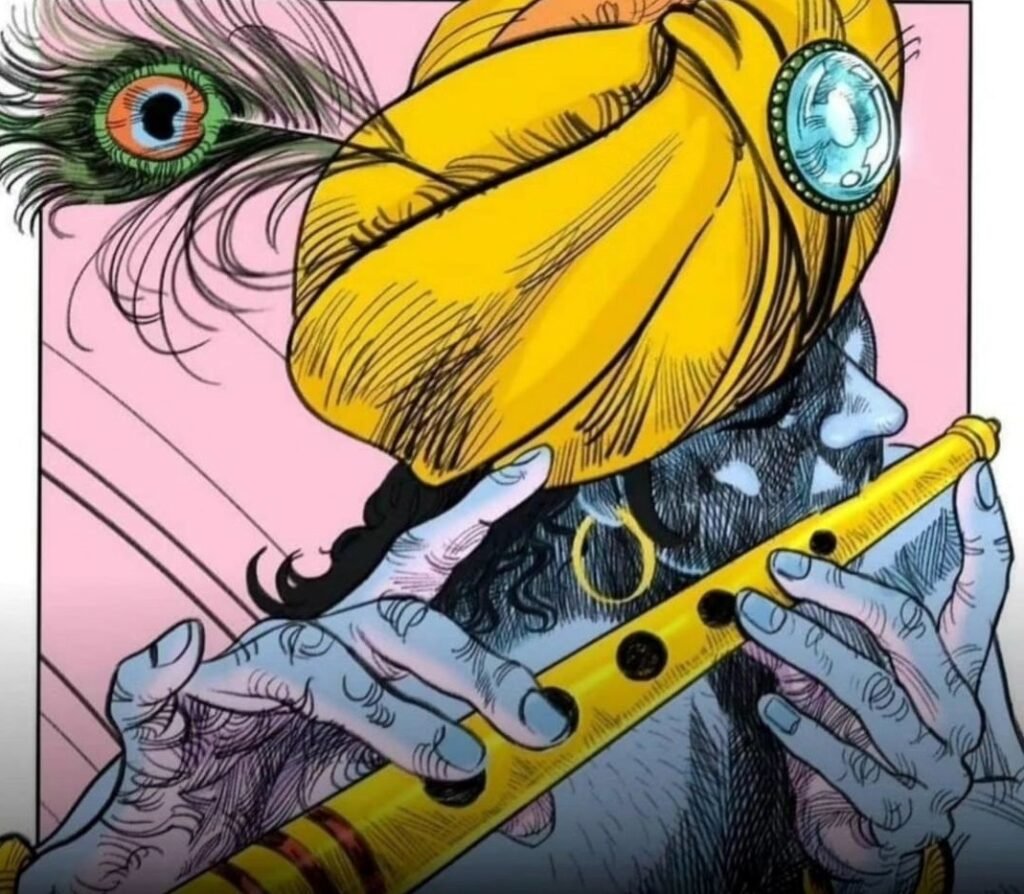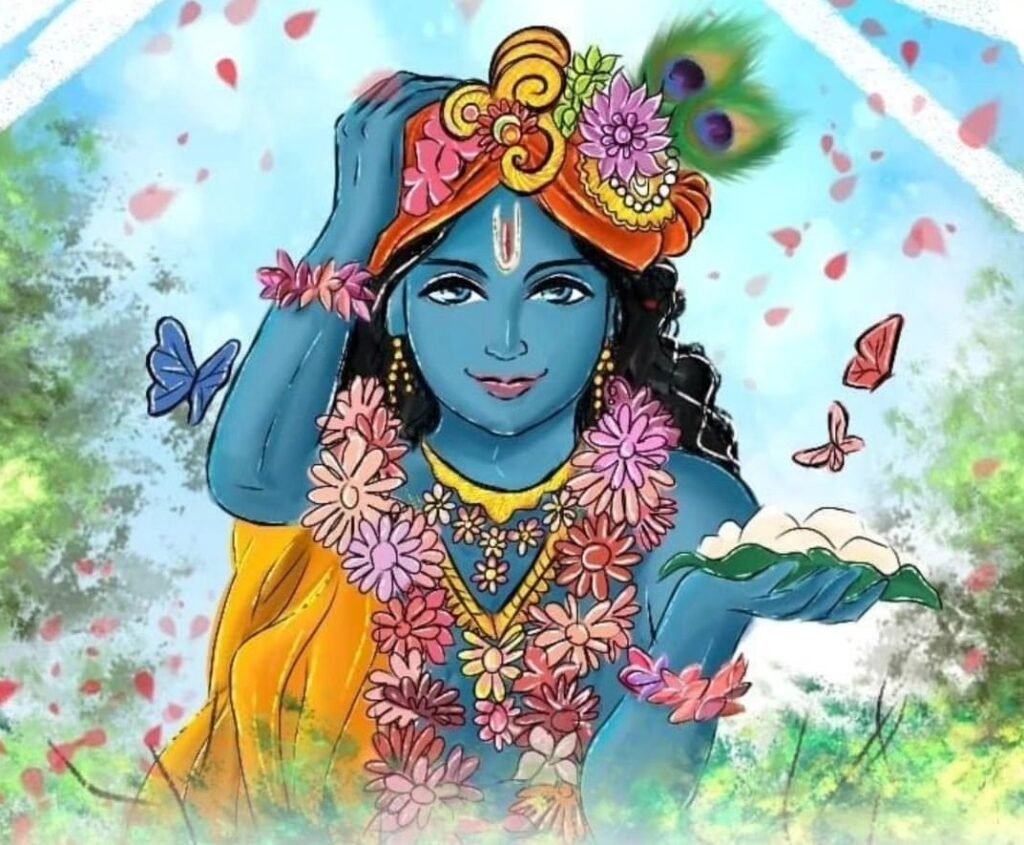Bhagwat Geeta Chapter 2 Shlok - 19
The illusion of death is intricately tied to the identification with the body, as explained in the Ramayan through the analogy:
“jauṅ sapaneṅ sira kāṭai koī, binu jāgeṅ na dūri dukh hoī.”
This verse suggests that if one dreams of their head being cut off, they will experience the pain until they awaken. Despite being an illusion within the dream, the pain persists until the dreamer is awake and the illusion is dispelled. Similarly, in the illusionary identification with the body, the fear of death arises. For an enlightened soul, freed from the shackles of this illusion, the fear of death dissipates.

Picture credit:-@krishna.paramathma
The question may arise: if nobody can truly kill anyone, why is murder deemed a punishable offense? The response lies in recognizing the body as the vehicle of the soul. Destroying the vehicle of any living being is considered an act of violence, and the Vedas explicitly instruct against such violence:
“mā hinsyāt sarvabhūtāni”
“Do not commit violence toward anyone.”
This injunction extends to the killing of animals, though exceptions exist in cases of self-defense. Instances such as an imminent snake bite, attacks with lethal weapons, or threats to one’s life sustenance may warrant the use of violence for self-protection. The Bhagavad Gita, as the dialogue unfolds, will provide detailed guidance on whether violence or non-violence is appropriate for Arjun in his current situation. Shree Krishna’s discourse will illuminate the principles underlying such decisions, offering priceless divine knowledge to shed light on this complex subject.

Picture credit:-@krishna.paramathma
मृत्यु का भ्रम जटिल रूप से शरीर की पहचान से जुड़ा हुआ है, जैसा कि रामायण में सादृश्य के माध्यम से समझाया गया है:
“जौं सपनें सिरा काटै कोई, बिनु जागें न दूरि दुख होई।”
यह श्लोक बताता है कि यदि कोई सपने में अपना सिर काटता हुआ देखता है, तो वह जागने तक दर्द का अनुभव करेगा। सपने में भ्रम होने के बावजूद दर्द तब तक बना रहता है जब तक सपने देखने वाला जाग नहीं जाता और भ्रम दूर नहीं हो जाता। इसी प्रकार, शरीर के साथ भ्रामक पहचान में मृत्यु का भय उत्पन्न होता है। एक प्रबुद्ध आत्मा के लिए, जो इस भ्रम के बंधन से मुक्त हो जाता है, मृत्यु का भय समाप्त हो जाता है।
प्रश्न उठ सकता है: यदि कोई सचमुच किसी की हत्या नहीं कर सकता, तो हत्या को दंडनीय अपराध क्यों माना जाता है? प्रतिक्रिया शरीर को आत्मा के वाहन के रूप में पहचानने में निहित है। किसी भी जीवित प्राणी के वाहन को नष्ट करना हिंसा का कार्य माना जाता है, और वेद स्पष्ट रूप से ऐसी हिंसा के खिलाफ निर्देश देते हैं:
“मा हिंसात् सर्वभूतानि”
“किसी के प्रति हिंसा न करें।”
यह निषेधाज्ञा जानवरों की हत्या तक फैली हुई है, हालांकि आत्मरक्षा के मामलों में अपवाद मौजूद हैं। आसन्न साँप के काटने, घातक हथियारों से हमला, या किसी के जीवन को खतरे में डालने जैसे उदाहरणों में आत्म-सुरक्षा के लिए हिंसा के उपयोग की आवश्यकता हो सकती है। जैसे-जैसे संवाद आगे बढ़ेगा, भगवद गीता इस बारे में विस्तृत मार्गदर्शन प्रदान करेगी कि अर्जुन की वर्तमान स्थिति में हिंसा या अहिंसा उपयुक्त है या नहीं। श्री कृष्ण का प्रवचन ऐसे निर्णयों में अंतर्निहित सिद्धांतों पर प्रकाश डालेगा, इस जटिल विषय पर प्रकाश डालने के लिए अमूल्य दिव्य ज्ञान प्रदान करेगा।
ମୃତ୍ୟୁର ଭ୍ରମ ଶରୀର ସହିତ ପରିଚୟ ସହିତ ଜଡିତ, ଯେପରି ରାମାୟଣରେ ଅନୁରୂପ ମାଧ୍ୟମରେ ବ୍ୟାଖ୍ୟା କରାଯାଇଛି:
“jauṅ sapaneṅ sira kāṭai koī, binu jāgeṅ na dūri dukh hoī।”
ଏହି ପଦଟି ସୂଚିତ କରେ ଯେ ଯଦି ଜଣେ ସେମାନଙ୍କ ମୁଣ୍ଡ କାଟିବାର ସ୍ୱପ୍ନ ଦେଖନ୍ତି, ସେମାନେ ଜାଗ୍ରତ ନହେବା ପର୍ଯ୍ୟନ୍ତ ଯନ୍ତ୍ରଣା ଅନୁଭବ କରିବେ | ସ୍ୱପ୍ନ ମଧ୍ୟରେ ଏକ ଭ୍ରମ ସତ୍ତ୍ Despite େ, ସ୍ୱପ୍ନ ଦେଖୁଥିବା ବ୍ୟକ୍ତି ଜାଗ୍ରତ ନହେବା ପର୍ଯ୍ୟନ୍ତ ଏବଂ ଭ୍ରମ ଦୂର ନହେବା ପର୍ଯ୍ୟନ୍ତ ଯନ୍ତ୍ରଣା ରହିଥାଏ | ସେହିଭଳି, ଶରୀର ସହିତ ଭ୍ରମାତ୍ମକ ପରିଚୟରେ ମୃତ୍ୟୁ ଭୟ ସୃଷ୍ଟି ହୁଏ | ଏହି ଭ୍ରମର ଶିକୁଳିରୁ ମୁକ୍ତ ହୋଇଥିବା ଜଣେ ଜ୍ଞାନୀ ପ୍ରାଣ ପାଇଁ ମୃତ୍ୟୁ ଭୟ ଦୂର ହୋଇଯାଏ |
ପ୍ରଶ୍ନ ଉଠିପାରେ: ଯଦି କେହି ପ୍ରକୃତରେ କାହାକୁ ହତ୍ୟା କରିପାରିବ ନାହିଁ, ତେବେ ହତ୍ୟା କାହିଁକି ଦଣ୍ଡନୀୟ ଅପରାଧ ବୋଲି ଧରାଯାଏ? ପ୍ରତିକ୍ରିୟା ହେଉଛି ଶରୀରକୁ ଆତ୍ମାର ଯାନ ଭାବରେ ଚିହ୍ନିବାରେ | ଯେକ living ଣସି ଜୀବଜନ୍ତୁଙ୍କ ଗାଡି ନଷ୍ଟ କରିବା ଏକ ହିଂସା କାର୍ଯ୍ୟ ଭାବରେ ବିବେଚନା କରାଯାଏ ଏବଂ ବେଦ ଏହିପରି ହିଂସା ବିରୁଦ୍ଧରେ ସ୍ପଷ୍ଟ ଭାବରେ ନିର୍ଦ୍ଦେଶ ଦେଇଥାଏ:

Picture credit:-@krishna.paramathma
“mā hinsyāt sarvabhūtāni”
କାହା ପ୍ରତି ହିଂସା କର ନାହିଁ।
ଏହି ନିଦେ୍ର୍ଦଶ ପଶୁମାନଙ୍କର ହତ୍ୟା ପର୍ଯ୍ୟନ୍ତ ବିସ୍ତାରିତ, ଯଦିଓ ଆତ୍ମରକ୍ଷା କ୍ଷେତ୍ରରେ ବ୍ୟତିକ୍ରମ ଅଛି | ସାପ କାମୁଡ଼ିବା, ସାଂଘାତିକ ଅସ୍ତ୍ରଶସ୍ତ୍ର ସହିତ ଆକ୍ରମଣ କିମ୍ବା ଜୀବନ ଜୀବିକା ପ୍ରତି ବିପଦ ଭଳି ଘଟଣା ଆତ୍ମରକ୍ଷା ପାଇଁ ହିଂସା ବ୍ୟବହାର କରିପାରେ। ସଂଳାପ ଚାଲିଥିବା ବେଳେ ଭଗବଦ୍ ଗୀତା ଅର୍ଜୁନଙ୍କ ସାମ୍ପ୍ରତିକ ପରିସ୍ଥିତିରେ ହିଂସା କିମ୍ବା ଅହିଂସା ଉପଯୁକ୍ତ କି ନୁହେଁ ସେ ସମ୍ବନ୍ଧରେ ବିସ୍ତୃତ ମାର୍ଗଦର୍ଶନ ଦେବ। ଶ୍ରୀ କୃଷ୍ଣଙ୍କ ବକ୍ତବ୍ୟ ଏହି ଜଟିଳ ବିଷୟ ଉପରେ ଆଲୋକ ପ୍ରଦାନ କରିବା ପାଇଁ ଅମୂଲ୍ୟ divine ଶ୍ୱରୀୟ ଜ୍ଞାନ ପ୍ରଦାନ କରି ଏହିପରି ନିଷ୍ପତ୍ତିଗୁଡିକର ନୀତିଗୁଡିକୁ ଆଲୋକିତ କରିବ |
